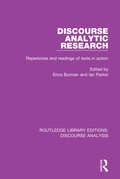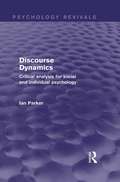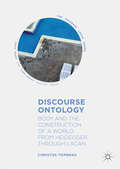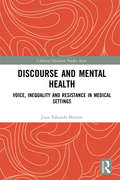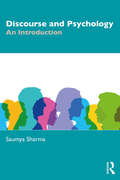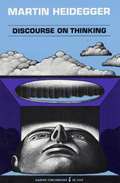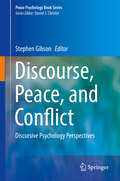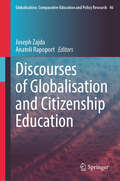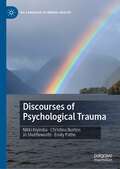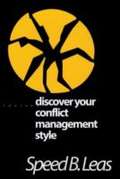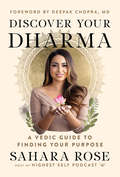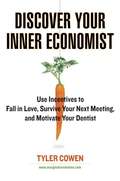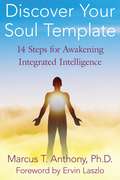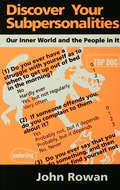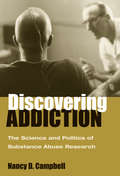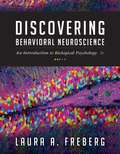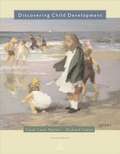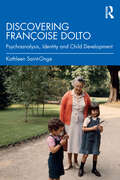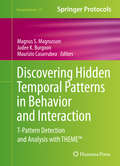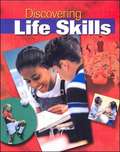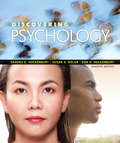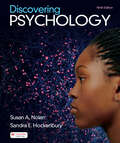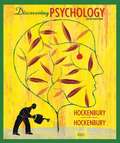- Table View
- List View
Discourse Analytic Research: Repertoires and readings of texts in action (RLE: Discourse Analysis)
by Erica Burman Ian ParkerFirst published in 1993, this book provides clear illustrations of discourse analytic work and empirical critiques of the traditional psychological approaches. Drawing on a range of examples, the contributors argue that identity, deeply felt emotions, prejudice, and attitudes to social issues are created by the language that describes them rather than being intrinsic to the individual. In illustrating the variety of methods available through their studies of punk identity, sexual jealousy, images of nature, political talk, sexism in radio, education case conferences and occupational choice, the contributors provide a challenging presentation of discourse analysis in a psychological context.
Discourse Dynamics: Critical Analysis for Social and Individual Psychology (Psychology Revivals)
by Ian ParkerWhat are discourses? Are discourses ‘real’, and what is real outside language? In this book, originally published in 1992, Ian Parker provides one of the clearest and most systematic introductions to discourse research and the essential theoretical debates in the area. At the time it was one of the few texts to defend a realist position, discuss accounts of postmodernity and set out criteria for the identification of discourses. Discourse Dynamics is essential reading to anyone interested in project research and an understanding of the theoretical issues involved in discourse analysis. The book will also be of use to students other than those studying psychology. It addresses the concerns of all those looking at qualitative textual research in the human sciences and is still very much relevant today.
Discourse Ontology: Body and the Construction of a World, from Heidegger through Lacan (The Palgrave Lacan Series)
by Christos TombrasThis book explores the themes within, and limits of, a dialogue between Martin Heidegger’s philosophy of being and Jacques Lacan’s post-Freudian metapsychology. It argues that a conceptual bridging between the two is possible, and lays the foundations of that bridge, starting with Heidegger and proceeding through the work of Lacan. After presenting basic aspects of Heidegger’s ontology, Tombras focuses on his incisive critique of modern science and psychoanalysis, and argues that psychoanalytic theory is vulnerable to this critique. The response comes from Lacan’s re-reading and recasting of fundamental Freudian insights, and his robust post-Freudian metapsychology. A broad discussion of Lacan’s work follows, to reveal its rupture with traditional philosophy, and show how it builds on and then reaches beyond Heidegger’s critique. This book is informed by the terminology, insights, concepts, hypotheses, and conclusions of both thinkers. It discusses time and the body in jouissance; the emergence of the divided subject and signifierness; truth, agency and the event; and being and mathematical formalisation. Tombras describes the ontological recursive construction of a shared ontic world and discusses the limits and historicity of this world.
Discourse Ontology: Body and the Construction of a World, from Heidegger through Lacan (The Palgrave Lacan Series)
by Christos TombrasThis book explores the themes within, and limits of, a dialogue between Martin Heidegger’s philosophy of being and Jacques Lacan’s post-Freudian metapsychology. It argues that a conceptual bridging between the two is possible, and lays the foundations of that bridge, starting with Heidegger and proceeding through the work of Lacan. After presenting basic aspects of Heidegger’s ontology, Tombras focuses on his incisive critique of modern science and psychoanalysis, and argues that psychoanalytic theory is vulnerable to this critique. The response comes from Lacan’s re-reading and recasting of fundamental Freudian insights, and his robust post-Freudian metapsychology. A broad discussion of Lacan’s work follows, to reveal its rupture with traditional philosophy, and show how it builds on and then reaches beyond Heidegger’s critique. This book is informed by the terminology, insights, concepts, hypotheses, and conclusions of both thinkers. It discusses time and the body in jouissance; the emergence of the divided subject and signifierness; truth, agency and the event; and being and mathematical formalisation. Tombras describes the ontological recursive construction of a shared ontic world and discusses the limits and historicity of this world.
Discourse and Mental Health: Voice, Inequality and Resistance in Medical Settings (Cultural Discourse Studies Series)
by Juan Eduardo BonninThis book is the result of years of fieldwork at a public hospital located in an immigrant neighborhood in Buenos Aires, Argentina. It focuses on the relationships between diversity and inequality in access to mental healthcare through the discourse practices, tactics and strategies deployed by patients with widely varying cultural, linguistic and social backgrounds. As an action-research process, it helped change communicative practices at the Hospital’s outpatient mental healthcare service. The book focuses on the entire process and its outcomes, arguing in favor of a critical, situated perspective on discourse analysis, theoretically and practically oriented to social change. It also proposes a different approach to doctor-patient communication, usually conducted from an ethnocentric perspective which does not take into account cultural, social and economic diversity. It reviews many topics that are somehow classical in doctor-patient communication analysis, but from a different point of view: issues such as the sequential organization of primary care encounters, diagnostic formulations, asymmetry and accommodation, etc., are now examined from a locally grounded ethnographic perspective. This change is not only theoretical but also political, as it helps understand patient practices of resistance, identity-making and solidarity in contexts of inequality.
Discourse and Psychology: An Introduction
by Saumya SharmaThis book presents a unique understanding of the interdependence between language and psychology and how one’s speech is shaped by and in turn shapes one’s thoughts, beliefs, and emotions. Drawing on the tenets of discourse analysis and psychology, it presents a comprehensive guide to a new and burgeoning area in linguistics and critical theory. The volume focusses on individual and group behaviour to show how identity formation is as much dependent on the psychological state as on social surroundings and context. It introduces various concepts from the sociocognitive framework, discursive and critical psychology, highlighting the myriad ways of approaching the complex interface between text, sociocultural factors, and cognitive processes. An indispensable guide to the complex world of language and the unconscious, the volume will be of interest to students and scholars of linguistics, applied linguistics, sociolinguistics, psychology and behavioural science, language, and critical theory. It is also a must-read for the general reader interested in language, communication, and social intelligence.
Discourse on Thinking
by Martin HeideggerDiscourse on Thinking questions that must occur to us the moment we manage to see a familiar situation in unfamiliar light.
Discourse, Dialogue and Technology Enhanced Learning
by Rachel PilkingtonDiscourse, Dialogue and Technology Enhanced Learning is invaluable to all those wanting to explore how dialogic processes work and how we facilitate them. Dialogue is an important learning tool and it is by understanding how language affects us and how we use language to encourage, empathise, inquire, argue and persuade that we come closer to understanding processes of change in ourselves and our society. Most researchers in Education will find themselves interpreting some form of data in the form of words; whether these words be explanations, conversations, narrations, reflections, debates or interviews and whether they are conducted through digital media or face-to-face. Discourse, textual or spoken, is therefore central to researching education. Each chapter focuses on the ways in which alternative levels of discourse analysis provide tools for the researcher, enabling insights into the way language works in learning, teaching practice and wider society. Drawing on the author's own 'DISCOUNT' discourse analysis coding scheme and including a wide range of dialogue examples, this book covers: Why Dialogue? The Role of Dialogue in Education. Debate: Learning to Argue and Arguing to Learn Towards Meaning-Making: Inquiry, Narrative and Experience The Role of the Significant Other: Facilitation, Scaffolding and Mediation Inclusion, Collaboration and Community Media, Mode and Digital Literacy Researching Voices and Texts Discourse, Dialogue and Technology Enhanced Learning will be an essential resource for all students, educators and educational researchers who have an interest in the role of discourse in educational contexts.
Discourse, Peace, and Conflict: Discursive Psychology Perspectives (Peace Psychology Book Series)
by Stephen GibsonThis first-of-its-kind volume brings discursive psychology and peace psychology together in a compelling practical synthesis. An array of internationally-recognised contributors examine multiple dimensions of discourse—official and casual, speech, rhetoric, and text—in creating and maintaining conflict and building mediation and reconciliation. Examples of strategies for dealing with longstanding conflicts (the Middle East), significant flashpoints (the Charlie Hebdo case), and current heated disputes (the refugee ‘crisis’ in Europe) demonstrate discursive methods in context as they bridge theory with real life. This diversity of subject matter is matched by the range of discursive approaches applied to peace psychology concepts, methods, and practice.Among the topics covered: Discursive approaches to violence against women.The American gun control debate: a discursive analysis.Constructing peace and violence in the Palestinian-Israeli conflict.Discursive psychological research on refugees. Citizenship, social injustice, and the quest for a critical social psychology of peace.The emotional and political power of images of suffering: discursive psychology and the study of visual rhetoric. Discourse, Peace, and Conflict offers expansive ideas to scholars and practitioners in peace psychology, as well as those in related areas such as social psychology, political psychology, and community psychology with an interest in issues pertaining to peace and conflict.
Discourses of Globalisation and Citizenship Education (Globalisation, Comparative Education and Policy Research #46)
by Joseph Zajda Anatoli RapoportThis book analyses dominant discourses of globalisation and citizenship in schools. It focuses on topics such as the impact of technology on inquiry in citizenship education and global citizenship teacher education through collaborative online international learning. The chapters in this volume advance further dominant discourses on the phenomenon of globalisation and citizenship education, and how it impacts the nature of teaching citizenship education in schools around the world. By building on intercultural dialogue, citizenship education, and values education in schools, the book promotes critical appraisal of various views of the world, and offers different ways to reconstruct and re-imagine social reality, and citizenship education for democracy and equality.
Discourses of Psychological Trauma (The Language of Mental Health)
by Nikki Kiyimba Christina Buxton Jo Shuttleworth Emily PatheThis book offers a critical perspective of the dominant discourses within the field of psychological trauma. It provides a challenge to normative western constructs and unsettles assumptions about accepted notions of universality and the nature of trauma. Traditionally the concept of psychological trauma has been widely accepted within mental health professions. However, in a post-positivist era, the language of mental health is shifting and making room for alternative discourses that include wider contextual influences, such as the impact of sociological, cultural, and technological developments. These wider discourses are illuminated as the authors draw together some of these arguments into one accessible text. Rather than claim definitive answers to the issues raised, readers are invited to engage with the discussions presented in order to position themselves in relation to the range of trauma discourses available.
Discover Your Conflict Management Style
by Speed B. LeasLeas, an Alban senior consultant and a nationally recognized authority on conflict in congregations, helps you to self-assess your conflict response and discover options appropriate to different levels of conflict. Leas draws on his years of experience helping conflicted congregations, providing valuable insights on the nature of conflict and its resolution. This new edition contains an improved Conflict Strategy Instrument, revised to reflect new learnings.
Discover Your Dharma: A Vedic Guide to Finding Your Purpose
by Sahara Rose KetabiSay Yes to Your Higher Calling."Discover Your Dharma is a timely book for readers to decondition their minds, remember their essence, and step into the purpose they were born to express." —From the foreword by DEEPAK CHOPRAIt is no coincidence you have found this book. Your soul is calling you to step fully into your purpose, your truth, the reason why you are here: your dharma. This lifetime is about figuring out what your dharma is. When you say yes to your higher calling, everything you've been seeking naturally manifests. This book will guide you through the journey and lead you to a life of happiness, abundance, joyful service, and fulfillment.In Discover Your Dharma, bestselling Ayurvedic author and Highest Self Podcast host Sahara Rose shares her unique approach to discovering your dharma through the Doshas (the Ayurvedic mind-body types) and the chakras (energy centers of the body). Take the "What's Your Dharma Archetype?" quiz and use your Dharma Blueprint to unlock the code of what you're meant to do next, in your relationships, business, and every facet of your life. Modernizing ancient Vedic wisdom, Sahara Rose shares how to remember your true essence, illuminate your path, and embrace your highest self.In her signature style, she offers personal stories and reflections on dharma discovery and embodiment. Discovering your dharma is the most important work you can do. This is the perfect introduction to living in alignment for all spiritual seekers and anyone looking to become more self-aware.Digital audio edition read by the author.
Discover Your Inner Economist: Use Incentives to Fall in Love, Survive Your Next Meeting, and Motivate Your Dentist
by Tyler CowenFreakonomics revealed much about our society. Now, one of America's most respected economists reveals how individuals can turn economic reasoning to their advantage in their daily life--at home, at work, even on vacation. Tyler Cowen explains how understanding the incentives that work best with each individual is the key to successful and satisfactory daily interactions--from getting the kids to do the dishes to having a productive business meeting, attracting a mate to finding a good guide in a foreign country. Discovering your inner economist, Cowen suggests, can lead to a happier, more satisfying life. What better carrot could you ask for?
Discover Your Soul Template: 14 Steps for Awakening Integrated Intelligence
by Ervin Laszlo Marcus T. AnthonyHow to create the life you want in alignment with your soul’s purpose • Reveal your soul aptitudes, limiting behaviors, and past-life karmic issues • Discover 14 easy-to-use spiritual tools to strengthen your intuition to profound levels and develop an inner source of guidance and wisdom for any situation • Learn why the Law of Attraction doesn’t work for most people and how to make it work for you Like an enlightened spiritual teacher, you, too, can tap in to the infinite wisdom of the cosmos to create a life of deep meaning and purpose. The key is integrated intelligence--your innate capacity, often experienced as “intuition,” to instantly draw upon knowledge beyond the confines of the five senses, from past, present, and future. Integrated intelligence enables not only a connection to the wisdom of the universe but also access to your soul template, revealing your self-limiting behaviors, karmic issues from past lives, and soul aptitudes--the abilities at which you excel. With knowledge of your soul template, you can successfully create the life you were meant to live in alignment with your soul’s purpose. Providing 14 easy-to-use spiritual tools to activate your integrated intelligence, Marcus Anthony shows you how to tap in to the wisdom of your soul template, distinguish the voice of ego from the voice of your inner sage, and strengthen your intuition to profound levels, thereby developing a trusted inner source of guidance. Explaining how the mind is not a shallow pond but an ocean of competing voices and energies, he reveals why the Law of Attraction doesn’t work for most people: any vision you attempt to manifest must be aligned with your soul template or the competing voices will act against it. Revealing how to bring the mind into presence to get “the secret” to work for you, Anthony shows how to use integrated intelligence to identify and live your true calling and create the life you want while fulfilling the deeper needs of your spirit.
Discover Your Subpersonalities: Our Inner World and the People in It
by John RowanHave you ever felt there is more than one you? That sometimes you are one type of person, sometimes another? Do you ever find yourself saying `yes' when you meant to say `no'? Or deciding to do one thing, then actually doing another?Most of us have had this experience of another personality taking us over, causing us to behave in an unintended way. Why do we do it? What's going on? Well known psychologist and writer John Rowan shows how each of us is made up of a number of `subpersonalities'. Some may help us, some may hinder us. If we want to be in charge of our inner world we had better find out who they are and what they do. John Rowan has written this book specifically to enable you to do this. Lively and entertaining, with questionnaires and simple exercises, Discover Your Subpersonalities will enable you to get to know the people inside you!
Discovering Addiction: The Science and Politics of Substance Abuse Research
by Nancy D. CampbellDiscovering Addiction brings the history of human and animal experimentation in addiction science into the present with a wealth of archival research and dozens of oral-history interviews with addiction researchers. Professor Campbell examines the birth of addiction science---the National Academy of Sciences's project to find a pharmacological fix for narcotics addiction in the late 1930s---and then explores the human and primate experimentation involved in the succeeding studies of the "opium problem," revealing how addiction science became "brain science" by the 1990s. Psychoactive drugs have always had multiple personalities---some cause social problems; others solve them---and the study of these drugs involves similar contradictions. Discovering Addiction enriches discussions of bioethics by exploring controversial topics, including the federal prison research that took place in the 1970s---a still unresolved debate that continues to divide the research community---and the effect of new rules regarding informed consent and the calculus of risk and benefit. This fascinating volume is both an informative history and a thought-provoking guide that asks whether it is possible to differentiate between ethical and unethical research by looking closely at how science is made. Nancy D. Campbell is Associate Professor of Science and Technology Studies at Rensselaer Polytechnic Institute and the author of Using Women: Gender, Drug Policy, and Social Justice. "Compelling and original, lively and engaging---Discovering Addiction opens up new ways of thinking about drug policy as well as the historical discourses of addiction." ---Carol Stabile, University of Wisconsin--Milwaukee Also available: Student Bodies: The Influence of Student Health Services in American Society and Medicine, by Heather Munro Prescott Illness and the Limits of Expression, by Kathlyn Conway White Coat, Clenched Fist: The Political Education of an American Physician, by Fitzhugh Mullan
Discovering Behavioral Neuroscience: An Introduction to Biological Psycology,3rd Edition
by Laura A. FrebergDISCOVERING BEHAVIORAL NEUROSCIENCE: AN INTRODUCTION TO BIOLOGICAL PSYCHOLOGY, 3rd Edition is written to appeal to a broad range of readers interested in a college-level introduction to biological or physiological psychology. Whether readers have a strong science background or are novices who feel intimidated at the prospect of the subject matter, this book's clear writing, high-interest examples, learning aids, and numerous illustrations will keep them interested and engaged. The book includes classic concepts, current topics, and cutting-edge research to provide readers with a foundational understanding of the structure and function of the nervous system and its relationship to both typical and disordered human behavior.
Discovering Child Development
by Carol Lynn Martin Richard FabesCengage Learning is pleased to welcome the author team of Carol Lynn Martin and Richard Fabes, and to offer their Discovering Child Development in a new edition aligned with our robust technology program. With targeted pedagogy, an unsurpassed illustration program that appeals to visual learners, and an emphasis on linking critical thinking about the issues to the real world, this text is ideally structured for chronological child development courses. The authors demonstrate the ways in which people, contexts, and experiences affect development, and why this stage of life is so unique.
Discovering Françoise Dolto: Psychoanalysis, Identity and Child Development
by Kathleen Saint-OngeThis psychobiographical study of the renowned French pediatrician and psychoanalyst Françoise Dolto introduces both her theories of child development and her unique insights into language and identity. A friend of Jacques Lacan’s, Dolto believed that we are all humanized through language, and that the words we use carry unconscious traces of our early histories of love, suffering and desire. Suggesting that infants unconsciously symbolize and that a continuous circulation of unconscious affects—the transference—prevails in all language-based relations, her findings challenge assumptions about autism, autobiography, linguistics, literacy, pedagogy and therapy. Dolto’s own corpus—a rich archive blending the personal and professional—demonstrates this, with echoes between Dolto’s constructs about the child and her own challenging childhood. This fascinating book will not only introduce the work of Françoise Dolto to many readers, but will be a valuable resource for all psychoanalytic researchers and theorists interested in childhood, language and identity.
Discovering Hidden Temporal Patterns in Behavior and Interaction
by Judee K. Burgoon Magnus S. Magnusson Maurizio CasarrubeaDiscovering hidden recurring patterns in observable behavioral processes is an important issue frequently faced by numerous advanced students and researchers across many research areas, including psychology, biology, sports, robotics, media, finance, and medicine. As generally, themany powerful methods included in statistical software packages were not developed for this kind of analysis, discovering such patterns has proven a particularly difficult task, due to a lack of a) adequate formalized models of the kinds of patterns to look for, b) corresponding detection algorithms and c) their implementation in available software. The research described in this book is based on the application of such pattern types, algorithms and software developed from the late seventies to the present in the context of research in collaboration with human and animal behavioral research teams at internationally leading universities in the US and Europe, thus testing the usefulness and validity of the pattern types, algorithms and software in numerous research areas. With the (scale independent statistical hierarchical and fractal-like) T-Pattern at its heart, a set of proposed pattern types, called the T-System, forms the basis for the search algorithms implemented as the software THEME (TM) (vs. 6), which is easily available in free educational and full commercial versions.
Discovering Life Skills (2nd Edition)
by Annette Gentry BaileyDiscovering Life Skills is an exploratory overview of Family and Consumer Sciences designed for middle school use. Discovering Life Skills can be used for a six-week, nine-week, or semester course. The 25 chapters correlate to the FACS modules sold by a variety of vendors. See the Module Crosswalk in the Teacher Resource Guide.
Discovering Psychology
by Don H. Hockenbury Sandra E. Hockenbury Susan A. NolanSandra Hockenbury and new coauthor Susan Nolan's remarkable textbook is grounded in the belief that all kinds of students can develop a real understanding of psychology and lasting scientific literacy. The authors act on that belief by using relatable personal stories to communicate the concepts of psychological science (and the process of science itself), and by presenting important research in a clear not oversimplified way. Hockenbury and Nolan also take full advantage of online learning, creating activities in LaunchPad that have students thinking about psychology as scientists do. New co-author, Susan Nolan of Seton Hall University was recently designated a Master Teacher by the Society for Teaching Psychology. She regularly gives talks about incorporating scientific literacy into the introductory course and across the psychology curriculum.
Discovering Psychology
by Sandra E. Hockenbury Susan A. NolanDiscovering Psychology is the most effective book available for helping students develop scientific literacy and explore the real impact of psychology across the breadth of cultural diversity.
Discovering Psychology (5th Edition)
by Don H. Hockenbury Sandra E. HockenburyUses engaging anecdotes and stories to make abstract material pertinent without over-simplifying the science. The fifth edition features new coverage of developments in the study of positive psychology, Asperger's syndrome, sleep, consciousness and sex differences in the brain, as well as new artwork, chapter summaries and revised appendices.
